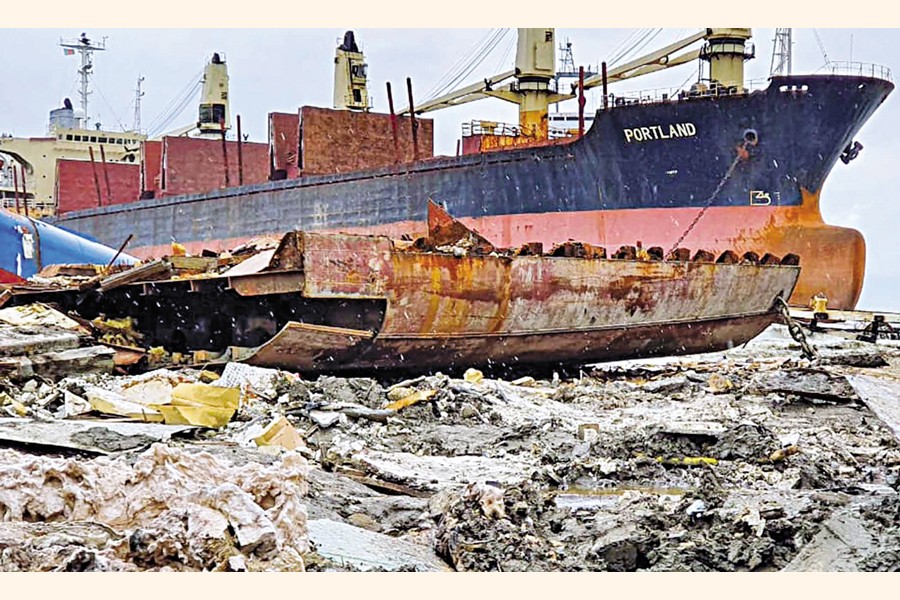
Published :
Updated :

The number of ships imported for dismantling increased in the country during the first half (H1) of 2023, keeping Bangladesh atop the list for dismantling scrapped vessels.
Bangladesh imported a total of 90 scrapped ships during the January-June period of 2023, which was about 40.62- percent higher than that of the same period of 2022.
The country brought a total of 64 ships from January to June period last year, according to data of the NGO Ship-breaking Platform (NSP).
The NSP is a global coalition of organisations working to reverse the environmental harm and human rights abuses caused by ship-breaking practices as well as to ensure safe and environmentally sound dismantling of ships worldwide.
Bangladesh imported a total of 122 end-of-life ships for dismantling in 2022, 254 ships in 2021, and 144 ships in 2020. The country dismantled a total of 236 ships in 2019, and 185 ships in 2018.
The local ship-breakers said ship import started falling in the second half of 2019, and later it declined further due to the Covid pandemic and virus-led shutdown.
But in 2021, their business turned around following the post-lockdown demand spree. The number of imported ships has again gone up in 2023, although the latest dollar crisis and its high rate have a negative impact on the trade, they added.
However, the rights groups concerned lamented both human and environmental hazards associated with ship-breaking globally. Local yard owners said safeguards have been in place and accidents are on the wane.
During the January-June period of this year, India imported a total of 61 scrapped ships, Pakistan six, Turkey 11, and the European Union 32. China dismantled no ship in H1 of 2023, according to the NSP data.
When asked, Bangladesh Ship Breakers and Recyclers Association (BSBRA) senior vice president Kamal Uddin Ahmed said they witnessed a dull business scenario in 2020 mainly due to the pandemic, when import of scrapped ships declined significantly.
Their business was good and many ships were imported following the post-Covid demand surge. However, the business was not going good after 2021 because of the high rate of US dollar and its shortage.
Regarding import of a high number of ships in H1 of 2023, he said ships imported through deferred letters of credit (L/Cs) came during the period.
"We can't open LCs, as banks are not willing to do it citing shortage of dollar."
He explained that the requirement of the central bank's approval for import above US$ 3.0 million has created problems for them, as ships cost higher than the ceiling.
The businesses are facing various difficulties, as they need a number of other approvals, including the environmental ones. They need up to two additional months to get the approvals, and by that time bank interest goes up, Mr Ahmed noted.
Besides, the industry has recently been brought under 'red' category from 'orange', and so the requirement of certifications or clearances has increased.
He claimed that the safety and other compliances have improved over the years, and currently there are some green ship-breaking yards in the country.
Talking to the FE, A M Nazim Uddin, joint convener of Ship-breaking Workers Trade Union Forum, alleged that the workers are not getting the minimum monthly wage, announced by the government four years back.
The workers are deprived of other lawful rights also, while safety equipments are not duly provided, he added.
The yard owners are investing in the recent years to comply with the Hong Kong Convention (HKC), which is for their business promotion only. They are also reluctant to ensure the workers' rights, the right groups alleged.
The platform has recorded some 11 accidents in the local ship-breaking industry from this January to June.
In Bangladesh, so far three ship-breaking yards have obtained Statements of Compliance (SoC) with the HKC, despite the fact that the operations still take place on tidal mudflats, and there is lack of proper infrastructure to contain pollutants and to manage several hazardous waste streams, it noted.
Absence of nearby hospitals to handle emergencies, poor occupational health and safety practices, systemic labour rights violations, and lack of transparency of the industry owners have further complicated the problems, associated with the South Asian ship-breaking industry.
These aspects highlight the need for stricter enforcement of international waste and labour laws as well as improved oversight in the industry, it noted.
In Bangladesh, India and Pakistan, where 90 per cent of the world's end-of-life tonnage is scrapped, hazardous wastes are simply dumped or managed in an unlawful way that put both the local communities and the environment at risk, the right groups said.
Ship-breaking plays an important role in the national economy by supplying raw materials for local steel and light-engineering industries. There are some 150 yards in the country, while 25-30 are in operation, according to the industry insiders.
Munni_fe@yahoo.com


 For all latest news, follow The Financial Express Google News channel.
For all latest news, follow The Financial Express Google News channel.